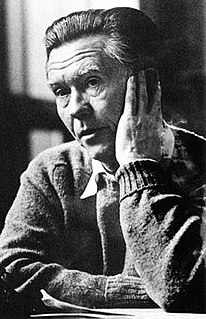A Quote by Joseph Gordon-Levitt
What makes a good work of art is something that honors certain traditions and breaks with others.
Related Quotes
What makes art Christian art? Is it simply Christian artists painting biblical subjects like Jeremiah? Or, by attaching a halo, does that suddenly make something Christian art? Must the artist’s subject be religious to be Christian? I don’t think so. There is a certain sense in which art is its own justification. If art is good art, if it is true art, if it is beautiful art, then it is bearing witness to the Author of the good, the true, and the beautiful
Every work of art causes the receiver to enter into a certain kind of relationship both with him who produced the art, and with all those who, simultaneously, previously, or subsequently, receive the same artistic impression. Art is a human activity- that one man consciously by means of certain external signs, hands on to others feelings he has lived through, and that others are touched by these feelings and also experience them.
Stop thinking about art works as objects, and start thinking about them as triggers for experiences... That solves a lot of problems ... Art is something that happens, a process, not a quality, and all sorts of things can make it happen ... [W]hat makes a work of art 'good' for you is not something that is already 'inside' it, but something that happens inside you.
There is a good deal of art that in some traditions of conceptual work are anti-affect, in fact a very large chunk of mainstream art after 1950 took against affect art altogether because they said, "No, we hate affect art because this is how we get manipulated by totalitarianism and therefore artists shouldn't play that game." And a lot of artists agreed to play that game, which I personally believe is to the loss of art.
In most modern instances, interpretation amounts to the philistine refusal to leave the work of art alone. Real art has the capacity to make us nervous. By reducing the work of art to its content and then interpreting that, one tames the work of art. Interpretation makes art manageable, conformable.
At that point, Noriko finally breaks down and begins to cry sobbing into her hands as the floodgates open - this young woman who has suffered in silence for so long, this good woman who refuse to believe she's good, for only the good doubt their own goodness, which is what makes them good in the first place. The bad know they are good, but the good know nothing. They spend their lives forgiving others, but they can't forgive themselves.
I have a feeling that art is something you do for yourself, and that any time you turn your decisions over to someone else you're postponing at best, your own development. The atmosphere of the workshop should be that of trying out one's own work and accepting the signals from others but not accepting the dictation of others because that is a violation of the spirit of art. Art can't be done by somebody else, it has got to be done by the artist.
What is it about a work of art, even when it is bought and sold in the market, that makes us distinguish it from . . . pure commodities? A work of art is a gift, not a commodity. . . works of art exist simultaneously in two “economies”, a market economy and a gift economy. Only one of these is essential, however: a work of art can survive without the market, but where there is no gift, there is no art.



































